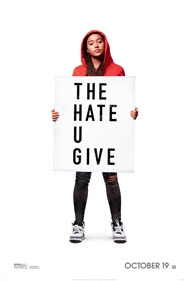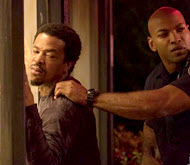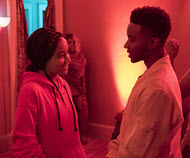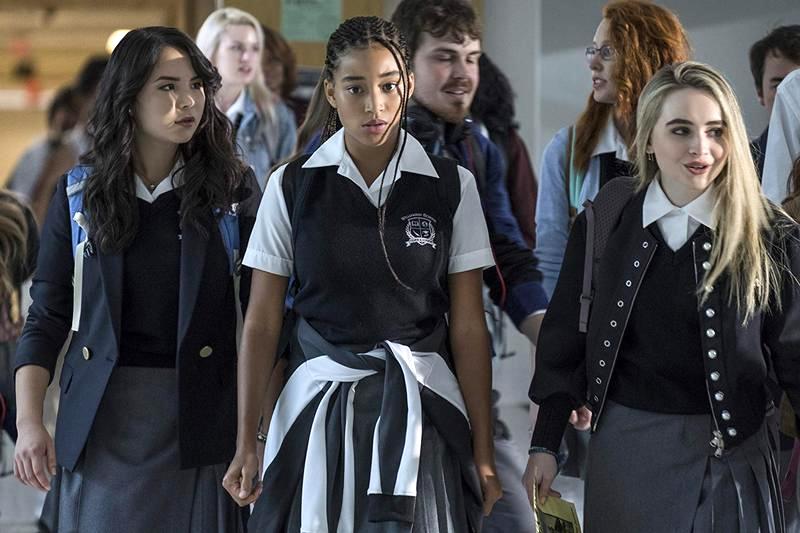The Hate U Give
 for mature thematic elements, some violent content, drug material and language.
for mature thematic elements, some violent content, drug material and language.
Reviewed by: Francisco Gomez Jr.
CONTRIBUTOR
| Moral Rating: | Offensive |
| Moviemaking Quality: |
|
| Primary Audience: | Young-Adults Adults |
| Genre: | Crime Drama Adaptation |
| Length: | 2 hr. 13 min. |
| Year of Release: | 2018 |
| USA Release: |
October 5, 2018 (limited—34 theaters) October 19, 2018 (wide—2,303 theaters) DVD: January 22, 2019 |




RACISM—What are the consequences of racial prejudice and false beliefs about the origin of races? Answer
The importance of standing against racism and hate

Drug dealers
Does an apparent lack of jobs and opportunities justify adopting a life of crime?
Police shootings

Dealing with the death of a childhood friend

| Featuring |
|---|
|
Amandla Stenberg … Starr Carter Regina Hall … Lisa Carter Russell Hornsby … Maverick “Mav” Carter Anthony Mackie … King Issa Rae … April Ofrah Common … Carlos Algee Smith … Khalil Sabrina Carpenter … Hailey K.J. Apa … Chris Dominique Fishback … Kenya Lamar Johnson … Seven Carter TJ Wright … Sekani Megan Lawless … Maya Rhonda Johnson Dents … Miss Rosalie Tony Vaughn … Mr. Lewis See all » |
| Director |
| George Tillman Jr. — “Faster” (2010), “Notorious” (2009), producer—“Barbershop” (2002) |
| Producer |
|
Fox 2000 Pictures State Street Pictures Temple Hill Entertainment See all » |
| Distributor |
“The Hate U Give” is directed by George Tillman Jr. and stars Amandla Stenberg as the main protagonist Starr Carter. It is based on the novel written by Angie Thomas. The film follows Starr as she deals with the loss of a friend Khalil (Algee Smith). Khalil is pulled over during a routine traffic stop after escaping from a party with Starr. The situation escalates, and Khalil is asked to step out of the car. While the officer runs his license, Khalil reaches in through the window for his hairbrush, and the officer shoots Khalil, as he mistakes the brush for a gun. Starr as a witness to the incident, must decide if she should testify in court for Khalil, or stay silent. Her decision comes in the midst of her trying to be a normal teenage girl, and having to deal with other problems along the way.
I’ve now had the privilege to review many movies under this fantastic ministry, and there has never been a harder movie to review because of the sensitive nature of the topic. Let’s explore this complex movie, its relevant issues, objectionable content, and moviemaking quality, asking God for guidance and blessing as we do it.
In terms of moviemaking quality, Tillman’s techniques work for the most part. While there is nothing incredibly groundbreaking, his directing hand is steady. The movie is further bumped by a fantastic and sometimes heartbreaking performance by Stenberg who clearly has a bright future in acting ahead of her. Smith—who is perhaps best known for his fantastic performance in “Detroit” (2017)—is on for a brief amount of time, but makes the most of it. As a matter of fact, the whole cast does a fantastic job. Audrey Wells did a good job with the adapted screenplay, without losing the pace of the film or bogging down the audience with too many details, as is the tendency in adaptations. Something that is perhaps hard to notice, but very well done, is the lighting that often serves to convey mood.
The real interesting part of this film is its handling of hot button issues, and they are issues that some try to avoid. They are not easy to understand and not easy to address, but let’s explore what the film has to say, and how it matches with God’s Word—the ultimate authority in the life of a follower of Christ.
Lessons
Disclaimer: This film is very clearly Left-leaning, and in no way do I agree with the entirety of the movie. However, as I have done with other films, I comment on issues, themes, and questions raised in the film to the best of my ability through God’s Word. My take on these hot button issues does not necessarily represent the opinions of Christian Answers. This disclaimer is often understood without saying, but I thought it may be necessary to explicitly explain, as I suspect this film may be of deeper personal connection to many viewers such as minorities or law enforcement. As a result, the relevant issues part of the review is longer than usual, as issues like these require much care. If you would like to jump to the objectionable content section of this review or my summary, skip ahead. Furthermore, the issues I explore are the larger problems of racism and prejudice, as police shootings is an issue too complex to explore in a movie review.
In the beginning of the film, Starr mentions the need of living a double life. Her family lives in Garden Heights: an impoverished neighborhood with a high crime rate. However, Starr goes to school at Williamson, a majority white school in a higher social economic area. This contrast creates a conflict within her, as she is in the middle of two worlds who do not really understand each other. To the residents of Garden Heights, Williamson people are a bunch of snobs who “pop molly’s (slang for ecstasy) and listen to Taylor Swift.” The Williamson people think Garden Heights residents are “hood.” The gap of understanding between these two worlds is a situation that we may often find ourselves in: it is hard to put yourself in the experience of others, when you have never been in that situation.
It is also easy to forget our own past hardships when one falls into comfort, as was often the case with the Israelites. They would cycle through being oppressed, falling into sin, being freed by God’s grace, becoming complacent, returning to sinful ways and oppressing others as they were oppressed. It was when the Israelites forgot what it felt like to be enslaved, that they began taking God’s freedom for granted, and their souls would harden. Everyone then did what was right in his own eyes.
“In those days Israel had no king; everyone did as they saw fit.” —Judges 21:25
If we get lost in our comfort and privilege, it is hard to focus on God. Just as King Solomon forgot about the One who gave him prosperity. This is why God commands us to keep him in focus.
“You shall love the Lord your God with all your heart, with all your soul, and with all your strength.” —Deuteronomy 6:5
The center of our lives must always be our Lord. What are the implications of this on an issue such as racism?
RACISM—What are the consequences of racial prejudice and false beliefs about the origin of races? Answer
 Get biblical answers to racial hot-topics. Where did the races come from? How did skin color come about? Why is it important to have a biblical foundation for such issues?
Get biblical answers to racial hot-topics. Where did the races come from? How did skin color come about? Why is it important to have a biblical foundation for such issues?
While there may be a lot of debate around issues such as police brutality, Black Lives Matter, and specific cases of police shooting an unarmed person of a minority, there is something that is not debatable: racism is an evil that Christians must oppose, and that Christ himself toppled on the cross. When we come to salvation, we are all one in Christ with no divisions based on races, ethnicity, gender or age.
“There is neither Jew nor Gentile, neither slave nor free, nor is there male and female, for you are all one in Christ Jesus.” —Galatians 3:28.
In fact, God does not look at humans as we often do. He is uninterested in their height, color, or appearance; what God wants to see in us is a pure heart—a heart that is devoted to holy righteousness—loving Him and our fellow humans.
“…the LORD said to Samuel, ‘Do not consider his appearance or his height, for I have rejected him. The LORD does not look at the things people look at. People look at the outward appearance, but the LORD looks at the heart.’” —1 Samuel 16:7
I think it’s safe to assume that most people in America—not just Christians—would agree that racism is not good. I suspect that relatively few people are consciously racist, however the film tries to tackle something deeper: prejudice. In one scene the film does a good job of showing the misunderstanding and underlying issue of both sides. Starr discusses the shooting with her uncle Carlos who works in law enforcement. Carlos explains that Khalil was acting erratic, and the officer naturally feared for his life. The officer had no way of knowing that Khalil was reaching for a hairbrush rather than a gun and responded by protecting himself. Carlos confesses that he would have most likely done the same.
To which Starr answers “If Khalil was white, would you have said ‘hands up,’ instead of shooting?” To which Carlos reluctantly answers, “Yes.” Carlos is black, and the movie argues that the issue is the prejudice we have towards others, without getting to know them or investigating them more.
The conversation in the film reminds me of a conversation I had with a friend. My friend is a mighty follower of Christ, and is extremely compassionate towards all people. That love for others has recently led to a calling of missions on her life. We discussed the hyper sensationalism of race in America—in news, media, and films (such as this one)—yet very few people seem to be consciously racist. She shared a story about how she was sitting in her car, and a group of black youth passed by. She instinctively locked her car for safety. She confessed that if it were a group of white youth, she would not have felt in danger. She realized that there were subtle, unconscious nuisances of prejudice present in her life.
Why is that? I do not pretend to speak for everyone, or to know the deep recesses of our fallen state, but I believe it’s simply the fear of what we do not entirely understand. She is most familiar with people who are like her, and naturally more cautious to unfamiliar people. The conflict of these two unfamiliar worlds are personified in Starr in the film. We fear what we do not understand, and we may not seek to understand because we fear. The police officer feared Khalil because he did not know him, all he knows is that he patrols through a dangerous neighborhood. Starr feared the police officer because of what she had been taught by her parents and seen in her experiences.
The movie makes a statement that “the hate you give, is the hate we give.” People often reciprocate what they experience in our sinful states. They reciprocate hate with hate, and violence with violence. This is why the Gospel—of which love and peace are integral—is so important in our times. Where misunderstanding remains, we are in danger of a never ending cycle of destruction.
Why? Because God is often absent from these types of hot topic discussions. Prejudice and racism is not a “white” condition, it is seen all around the world with different types of people oppressing others. Prejudice and racism are a sin condition. Like any other sin, it can only be fully treated by the transformative power of Christ through the renewing of our minds.
“Therefore, I urge you, brothers and sisters, in view of God’s mercy, to offer your bodies as a living sacrifice, holy and pleasing to God—this is your true and proper worship. Do not conform to the pattern of this world, but be transformed by the renewing of your mind. Then you will be able to test and approve what God’s will is—his good, pleasing and perfect will.” —Romans 12:1
However, both sides often ignore God. The Left tries to address these issues secularly, and the result—also depicted in the film—is reciprocating the perceived wrong doing with violence. Peaceful protests may become violent protests as has been the case in a few Black Lives Matter rallies. On the other side, some Christians may be concerned with being a stereotypical Christian conservative, forgetting that our true goal is to be like Christ, not an American archetype of superficial righteousness. The result of both these extremes is dangerous.
Do not allow the Enemy to perpetuate evil by keeping the Church out of these discussions, or by making us think that issues such as these are “Liberal” or “secular.” The secular world too often controls the narrative. The evils of racism are allowed to persist because the Left (such as this book and film) approaches the issue secularly, and some Christians may excuse themselves from approaching the issue at all by claiming to avoid corroborating with the liberal, secular world, etc. The secular world, Black Lives Matter, and politics are not the light of the world; we are. We should not leave these issues to be dealt with by others by standing aside and secluding ourselves.
“My prayer is not that you take them out of the world but that you protect them from the evil one.” —John 17:15
We should ask God to transform our minds so we may be able to discern what His “good, pleasing and perfect will” is in hard topics like these. Let us not shy away from them, but charge toward them with the banner of the Gospel. For the Gospel is power.
“For I am not ashamed of the gospel, because it is the power of God that brings salvation to everyone who believes…” —Romans 1:16
Only God can transform and change our sinful tendencies, and align us with His perfect will—as long as we make ourselves available to Him.
“Create in me a clean heart, O God, and renew a right spirit within me.” —Psalm 51:10
Join me in asking God what he wants his people to do when it comes to hard topics as these. Asking Him for wisdom along the way.
“If any of you lacks wisdom, you should ask God, who gives generously to all without finding fault, and it will be given to you.” —James 1:5
Lord give us the ears and discernment to carry out Your will and share Your Gospel.
“Whoever has ears, let them hear what the Spirit says to the churches. To the one who is victorious, I will give the right to eat from the tree of life, which is in the paradise of God.” —Revelation 2:7
Did God make the world the way it is now? What kind of world would you create? Answer
Why does God allow innocent people to die or suffer? Answer
What about the issue of suffering? Doesn’t this prove that there is no God and that we are on our own? Answer
Does God feel our pain? Answer
ORIGIN OF BAD—How did bad things come about? Answer
Thank you for bearing with me on a hard topic, let’s get back to the content of the film.
Objectionable Content
Vulgar Language and Profanity: Language is one of this film’s biggest problems. It was surprising to see how prevalent it was. An f-word automatically warrants a “Heavy” rating. Words to expect are: f-words (4—with 2 simply represented by an “F”) • s-words (30) • “a**” (15+) • “p*ss” / “p*ssing” / “p*ssed” • “bitch” • “son of a b*tch” • “Tag team a ho” (whore) • “Hos” • “Hoe-dome” • “Holy sh*t” • “Oh my G*d” (5) • “G*d” • “d*mn” (14) • “H*ll” (7)
Violence: The strongest instance of violence is the shooting of Khalil. He lays on the floor bleeding and convulsing as Starr cries by her side. There are guns present throughout the movie. There are instances of rioting shown.
Sex/Nudity: There is no nudity in the film. Starr and her boyfriend occasionally kiss. There are a few non explicit crude jokes made by Starr’s parents. It is also implied that Starr’s boyfriend wanted to have extramarital sex, as he pulled out a condom in one instance, but Starr rejected his advances. In a party scene, there are a few quick shots of sexually suggestive dancing.
Alcohol/Drugs: Alcohol is present during a party, and underage drinking is implied. References to molly (ecstasy) and drug dealing is made.
Summary
Movie review: Final Solution (2002)
Documentary: “From One Blood: The Story of Gerrit Wolfaardt” (2003)
Directing his cast of actors, Tillman produced a film that has good cinematic quality. The issues raised are important ones. Of course, the film is not written from a Christian perspective, and thus many of its concepts and handling of issues are divergent from some of our beliefs. Furthermore, a few other movies may have explored this issue better. Christians should not need a secular movie to get involved in issues like these. However, this film may be useful to some who are not sufficiently familiar with how some secularists think about these issues, and, as a result, may have difficulty sharing the Gospel with them—or understanding them. However, you must personally discern and pray about whether this movie will be conducive to your spiritual growth, or if its content (which includes plenty of language) is more likely to be a stumbling block for you. Remember…
“Above all else, guard your heart, for everything you do flows from it.” —Proverbs 4:23
- Violence: Heavy
- Vulgar/Crude language: Heavy
- Profane language: Heavy
- Sex: Moderately Heavy
- Nudity: None
- Occult: None
Followers of Christ should keep in mind that the Son of God did not come to live and die in the unjust ancient world (of the Jews, Romans, Greeks, Samaritans, slavery, poverty and oppression) inorder to bring SOCIAL JUSTICE to the world. He came to provide the light of truth and offer ETERNAL LIFE. Read the Bible and you will see that although Jesus hates truly injustice, He did not come to be a Social Justice Warrior (SJW). The Bible reveals that this sin-depraved world, dominated by mankind’s powerful Enemy and his host of followers, will remain wicked and unjust until Christ returns in judgment.
Our Lord’s great commission to His disciples (and all His followers) is to become His witnesses—telling all who He truly is and sharing the good news of the SALVATION that He has made freely available to all who truly believe in Him—and who therefore confess their personal sins and repent—surrendering their lives to Him.
He commanded us to “go and make disciples of all nations, baptizing them in the name of the Father and of the Son and of the Holy Spirit, and teaching them to obey everything I have commanded…” Jesus Christ is the only ultimate answer to our true need and the world’s troubles; anything else is just a temporary band-aid.
(Also learn about Christian love, mercy and the goodness of God)
See list of Relevant Issues—questions-and-answers.


Don’t forget what case put that movement in the spotlight. The Michael Brown shooting. A kid who stole a box of cigarillos, shoved a store manager, and tried to disarm a police officer and shoot him. The Black Lives Matter movement is an illegitimate movement that claims that police officers are systematically racist. Which is not true. Also, as a black person, you are way more likely to get shot in inner cities like Chicago (near where I used to live) by another black person than by a police officer. In 2016 there were 762 homicides in Chicago and nearly all of them came from the inner city neighborhoods where most of the victims were black and they were killed by another black person.
Black Lives Matter doesn’t truly care about Black Lives, because, if they did, why aren’t they saying something about all the violence in the cities of Chicago, New York, Baltimore, etc.
I also condemn the movement because of all the hatred it aims at police officers. This group has said on live TV, “What do we want? Dead cops! When do we want it? Now!”. They have also said, “Pigs in a blanket, fry it like bacon” and “F the police.”See all »
See all »“We affirm the lives of Black queer and trans folks, disabled folks, undocumented folks, folks with records, women, and all Black lives along the gender spectrum. Our network centers those who have been marginalized within Black liberation movements.
We are working for a world where Black lives are no longer systematically targeted for demise.
We affirm our humanity, our contributions to this society, and our resilience in the face of deadly oppression.”
This is a very one-sided movie when it comes to the controversial topic of racism. The film heavily motions us to believe the typical propaganda that the majority of “white” people are rich, fancy, snobby, ignorant racists, and all the people in the “colored” communities are the poor, extremely oppressed, and tormented ones who suffer primarily at the hands of whites in all matters in life, and only do crime and other bad things because of white oppression.
This story apparently ignores the thousands and thousands of white people who strive (AND STILL STRIVE TO THIS DAY) for equal rights and equal treatment for blacks and others of color, and instead sets up white people as the bad guys, and preaches that the portion of discriminating whites can represent practically ALL whites. This movie doesn’t seem to strive for fair equality—it paints whites as the antagonizing side, a side that the black protagonists are supposed to fight and win against. Such indoctrination is what made me get up and leave the showing.
Yes, there are racist white people who hate colored individuals, but they DO NOT stand as examples of all white people. I have grown up in America with a fleshly suit of tan and black hair, and I can’t even recall the last time I was discriminated against. Every single white person whom I have encountered in church and in the store has yet to ever be mean to me. I do feel pity for those of other colors who have not had the privilege of being around such kind people as I have.
Anyone of ANY color has the capability to be racist—it all just comes down to who they are on the inside, and whether or not Christ is in them.
Moral rating: Offensive / Moviemaking quality: 2½
Our main protagonist in this movie is a girl named Starr who lives in a place called Garden Heights, which she describes as the most perfect place to live because “her people” live there. Ironically in the next shot you see the local barbershop owner opening his shop, but as he’s doing it you see him unlock the bars off the windows (so it’s not a perfect place like Starr makes it seem like). She says the local high school is where you go to get jumped, pregnant, or high. So she goes to Williamson High School, where she pretends to not act ghetto until the weekend.See all »
Moral rating: Extremely Offensive / Moviemaking quality: ½
PLEASE share your observations and insights to be posted here.



I really wish that instead of rushing to demonize something, we took more than a 2 minute trailer to seek to understand it. What this film shows is how a young activist found her passion and voice from a personal (and traumatic) experience. This is often the case of many activists. It may not be an experience we can relate to or agree with, but perhaps we wouldn’t be so polarized if we tried to empathize. James 1:19 calls us to be quick to listen and slow to speak. Jumping the gun on a 2 minute trailer is definitely not doing that.
I could partially relate to the main character of Starr. I am a middle class black woman, who grew up attending schools and living in neighborhoods where I was often “the only one” (I was one of 2 black students in my graduating class, and there were 4 of us in the entire high school). Unless you know what it’s like to be “the only one” (of ANYTHING), I caution against mocking the experience as John does. Could it be that Starr sees her neighborhood as “perfect” not in a sense of there being no crime or perfect harmony, but because it’s where she can be herself and be accepted?See all »
My Ratings: Moral rating: Average / Moviemaking quality: 5